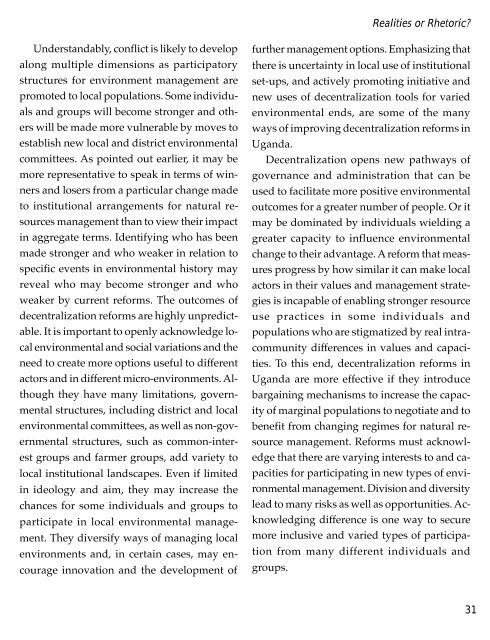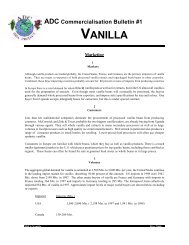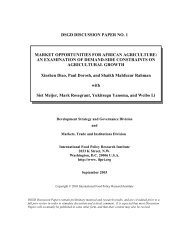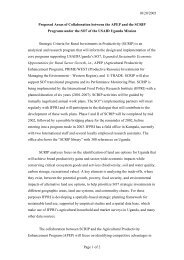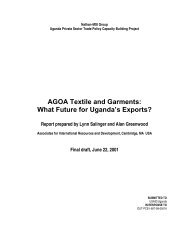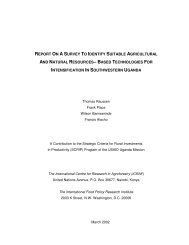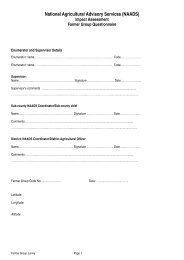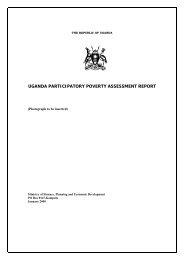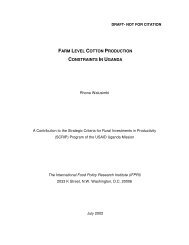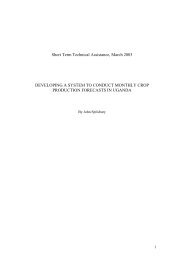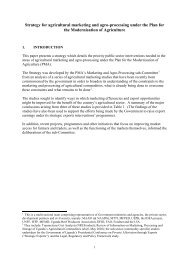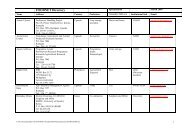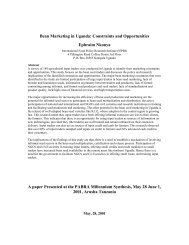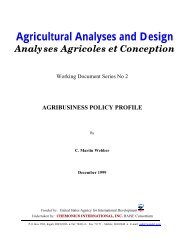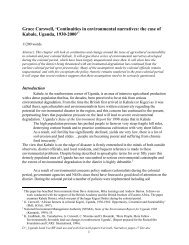Decentralisation in Uganda Rhetoric-Chapter3. - Foodnet
Decentralisation in Uganda Rhetoric-Chapter3. - Foodnet
Decentralisation in Uganda Rhetoric-Chapter3. - Foodnet
You also want an ePaper? Increase the reach of your titles
YUMPU automatically turns print PDFs into web optimized ePapers that Google loves.
Understandably, conflict is likely to develop<br />
along multiple dimensions as participatory<br />
structures for environment management are<br />
promoted to local populations. Some <strong>in</strong>dividuals<br />
and groups will become stronger and others<br />
will be made more vulnerable by moves to<br />
establish new local and district environmental<br />
committees. As po<strong>in</strong>ted out earlier, it may be<br />
more representative to speak <strong>in</strong> terms of w<strong>in</strong>ners<br />
and losers from a particular change made<br />
to <strong>in</strong>stitutional arrangements for natural resources<br />
management than to view their impact<br />
<strong>in</strong> aggregate terms. Identify<strong>in</strong>g who has been<br />
made stronger and who weaker <strong>in</strong> relation to<br />
specific events <strong>in</strong> environmental history may<br />
reveal who may become stronger and who<br />
weaker by current reforms. The outcomes of<br />
decentralization reforms are highly unpredictable.<br />
It is important to openly acknowledge local<br />
environmental and social variations and the<br />
need to create more options useful to different<br />
actors and <strong>in</strong> different micro-environments. Although<br />
they have many limitations, governmental<br />
structures, <strong>in</strong>clud<strong>in</strong>g district and local<br />
environmental committees, as well as non-governmental<br />
structures, such as common-<strong>in</strong>terest<br />
groups and farmer groups, add variety to<br />
local <strong>in</strong>stitutional landscapes. Even if limited<br />
<strong>in</strong> ideology and aim, they may <strong>in</strong>crease the<br />
chances for some <strong>in</strong>dividuals and groups to<br />
participate <strong>in</strong> local environmental management.<br />
They diversify ways of manag<strong>in</strong>g local<br />
environments and, <strong>in</strong> certa<strong>in</strong> cases, may encourage<br />
<strong>in</strong>novation and the development of<br />
Realities or <strong>Rhetoric</strong>?<br />
further management options. Emphasiz<strong>in</strong>g that<br />
there is uncerta<strong>in</strong>ty <strong>in</strong> local use of <strong>in</strong>stitutional<br />
set-ups, and actively promot<strong>in</strong>g <strong>in</strong>itiative and<br />
new uses of decentralization tools for varied<br />
environmental ends, are some of the many<br />
ways of improv<strong>in</strong>g decentralization reforms <strong>in</strong><br />
<strong>Uganda</strong>.<br />
Decentralization opens new pathways of<br />
governance and adm<strong>in</strong>istration that can be<br />
used to facilitate more positive environmental<br />
outcomes for a greater number of people. Or it<br />
may be dom<strong>in</strong>ated by <strong>in</strong>dividuals wield<strong>in</strong>g a<br />
greater capacity to <strong>in</strong>fluence environmental<br />
change to their advantage. A reform that measures<br />
progress by how similar it can make local<br />
actors <strong>in</strong> their values and management strategies<br />
is <strong>in</strong>capable of enabl<strong>in</strong>g stronger resource<br />
use practices <strong>in</strong> some <strong>in</strong>dividuals and<br />
populations who are stigmatized by real <strong>in</strong>tracommunity<br />
differences <strong>in</strong> values and capacities.<br />
To this end, decentralization reforms <strong>in</strong><br />
<strong>Uganda</strong> are more effective if they <strong>in</strong>troduce<br />
barga<strong>in</strong><strong>in</strong>g mechanisms to <strong>in</strong>crease the capacity<br />
of marg<strong>in</strong>al populations to negotiate and to<br />
benefit from chang<strong>in</strong>g regimes for natural resource<br />
management. Reforms must acknowledge<br />
that there are vary<strong>in</strong>g <strong>in</strong>terests to and capacities<br />
for participat<strong>in</strong>g <strong>in</strong> new types of environmental<br />
management. Division and diversity<br />
lead to many risks as well as opportunities. Acknowledg<strong>in</strong>g<br />
difference is one way to secure<br />
more <strong>in</strong>clusive and varied types of participation<br />
from many different <strong>in</strong>dividuals and<br />
groups.<br />
31


